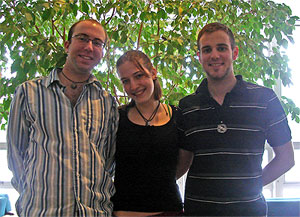 |
| Michael van den Hoek, Ayla Monic Matina McKay and Mike Morse will observe Pagan rituals during the holidays. (Stephanie Smith Photo) |
Michael van den Hoek, Ayla Monic Matina McKay and Mike Morse are three Dalhousie students who, as Pagans, celebrate the holidays a little differently than most.
Mr. van den Hoek is a second-year neuroscience student and the founder of Dalhousie Pagans, a society comprised of open-minded individuals who walk alternative spiritual paths, including Wicca, Druidism, Asatru, Shamanism, and Eclecticism. The word pagan is from Latin paganus, an adjective originally meaning “rural” or “of the country.” The term has come to connote a broad set of spiritual practices or contemporary religions based on a reverence for nature.
“I believe in the existence of several deities and worship a certain set of gods,” says Mr. van den Hoek, 19. He discovered his faith while helping a friend do research on Wicca.
Despite his beliefs, he and his family still celebrate Christmas and he does his own religious ceremony for Winter Solstice (also known as Yule), one of the oldest winter celebrations in the world. The Winter Solstice falls on the shortest day of the year — this year falling on December 22 — and was celebrated in Britain long before the arrival of Christianity.
“(My religious ceremony) is solitary one. I sit in front of an altar with images of gods, relaxing, meditating and giving thanks,” says Mr. van den Hoek, from Great Village, Nova Scotia.
Because Paganism is very diverse with many distinct traditions, the forms of Pagan worship vary widely. For Ms.McKay, a second-year biology student at Dal, Yule represents the rebirth of the god form who dies earlier in the year. The word “yule” comes from “houl,” meaning “wheel” in the language of the Norsemen of Northern Europe. The Norse saw the sun as a wheel that changed the seasons.
”It’s essentially a celebration of death and rebirth which corresponds with the Earth’s natural cycle,” says Ms. McKay.
Yule can also be a time for taking time to reflect and make changes in your life, they say.
“Yule is the time to manifest new changes, it’s kind of like the secular new year (New Year’s Eve),” says van den Hoek.
Morse, 21, considers himself a “general” Pagan. He celebrates both Yule and Christmas.
“I take it to a more personal level. I give gifts and have get-togethers with friends. I also spend time reflecting and try to make it more heartfelt,” says Morse who dabbles in heathenry and druidism.
“My family never celebrated (Christmas) in a religious context,” adds Ms.McKay. “It’s always been a holiday about family, generosity and love.”
“Christmas is the fun family thing while Yule is my religious observance,” says Mr.van den Hoek.
SEE: Religion & Ethics — Paganism — at BBC | Tiger Society: Dal Pagans
